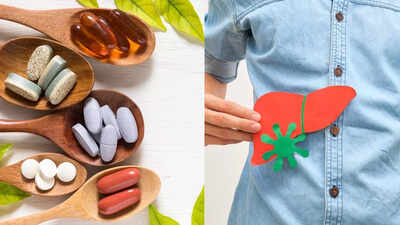Risks of high-dose vitamins: How Vitamin A, D, E, Niacin and others can harm your heart and liver |

Vitamins and dietary supplements are often viewed as harmless additions to daily health routines, but recent scientific evidence shows that certain high-dose supplements may cause more harm than good. While vitamins are essential for normal body function, excessive or unnecessary supplementation can place significant stress on the heart, liver and metabolic system. Fat-soluble vitamins, in particular, tend to accumulate in the body, increasing the risk of toxicity when taken in large amounts.
5 vitamins and supplements linked to heart and liver damage
1. Vitamin AVitamin A is essential for vision, immunity and skin health. However, because it is fat-soluble, the body stores excess amounts in the liver rather than excreting them. High-dose supplementation can therefore lead to accumulation and toxicity, causing liver inflammation, fibrosis and, in severe cases, liver failure. Excessive Vitamin A intake has also been associated with increased pressure inside the skull, bone fragility and potential disturbances in cholesterol metabolism, indirectly affecting cardiovascular health when consumed at unsafe levels.A study published in the Journal of Hepatology reported that chronic high intake of Vitamin A significantly increased the risk of liver toxicity, with biopsy samples showing liver cell injury, fibrosis and early signs of cirrhosis among long-term high-dose users.2. Vitamin DVitamin D supports bone strength, immune function and hormone regulation. However, excessive supplementation can lead to Vitamin D toxicity, a condition that causes dangerously high calcium levels in the blood (hypercalcaemia). This can harden and calcify blood vessels, damage heart valves, and strain the kidneys and liver. High-dose Vitamin D is often taken without testing levels first, which increases the risk of accidental overdose and long-term cardiovascular complications.A study in the American Journal of Medicine found that individuals taking high-dose Vitamin D supplements had an increased risk of hypercalcaemia, which was associated with vascular calcification and reduced cardiovascular function.3. Vitamin EVitamin E is a powerful antioxidant, but when taken in large supplemental doses, it can thin the blood excessively and interfere with normal clotting. This may raise the risk of haemorrhagic stroke and increase bleeding tendencies. Some research also suggests that high doses may contribute to oxidative stress in the liver and disrupt lipid metabolism, creating additional cardiovascular strain.A study published in the Journal of the American Medical Association (JAMA) concluded that high-dose Vitamin E supplementation was linked to an increased risk of haemorrhagic stroke. The findings indicated that doses above 400 IU daily may raise the likelihood of uncontrolled bleeding.4. Niacin (Vitamin B3)Niacin is used to support cholesterol management and energy production. However, supplement forms often contain doses far exceeding dietary needs. High-dose niacin can overload the liver, causing enzyme elevation, hepatitis or liver failure. It also increases inflammation in blood vessels and may promote arterial plaque buildup, reversing the very heart-protective effects it is often taken for.A study in Nature Medicine found that elevated niacin metabolites were strongly associated with arterial inflammation and a higher risk of cardiovascular events. The study suggested that excessive niacin intake may contribute to plaque formation and worsen heart disease risk.5. Green tea extractGreen tea extract contains concentrated levels of catechins, especially EGCG. While drinking green tea is safe, the supplement form delivers much higher doses, which can overwhelm the liver’s detoxification pathways. Liver injury caused by high-dose green tea extract has been reported worldwide, especially in weight-loss supplements. Excess catechins may also raise oxidative stress and strain cardiovascular function.A study published in the European Food Safety Authority (EFSA) Journal concluded that catechin intake above 800 mg per day could cause liver enzyme elevation and increase the risk of liver injury. The review highlighted high-dose green tea extract as a major contributor to supplement-induced liver toxicity.Disclaimer: This article is for informational purposes only and should not be considered medical advice. Please consult a healthcare professional before making any changes to your diet, medication, or lifestyle.





